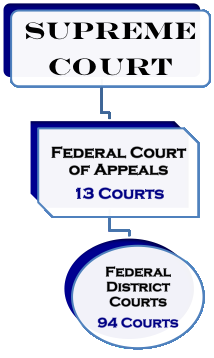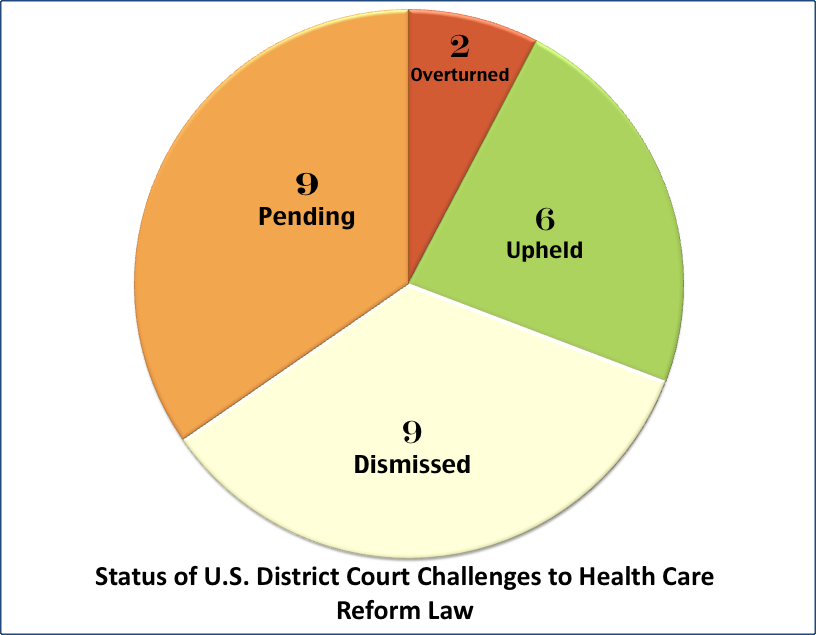Legal challenges to national health care reform have proliferated since the Affordable Care Act (ACA) became law in March 2010. There have been 26 federal lawsuits filed seeking to overturn the legislation, most of them challenging the constitutionality of the ‘individual mandate’ – the requirement that all Americans carry health insurance by 2014 or pay a tax penalty. Proponents of the ‘individual mandate’ contend that the health care sector takes up a rapidly growing share of interstate commercial activity and the Constitution grants Congress the power to regulate that commerce. Opponents argue that the Constitution’s commerce clause applies only to economic activity; because the decision not to buy insurance is economic inactivity, there is no constitutional basis for Congressional regulation.
Twenty-six states have banded together and jointly filed Florida vs HHS. This is the most watched of all the legal challenges to the new health care law because of its size and the likelihood that it will be granted an expedited hearing before the U.S. Supreme Court. Oklahoma and Virginia have each filed separate legal challenges. In addition to the states, lawsuits have been filed by plaintiffs from all walks of life, including individual citizens and small groups, businesses and business-owners, physicians, associations, hospitals, universities, and lawyers.
With so many different cases working their way through our complicated judicial system, it’s easy to lose track of the big picture. This post breaks it down, beginning with the Federal District Courts, the first stop for any case on its way to a Supreme Court hearing. This chart shows the outcome of district court challenges to date:
Of the 26 lawsuits, nine cases have been dismissed (in one case the plaintiff has the right to refile), nine are awaiting a ruling, two rulings overturned all or part of the Affordable Care Act (ACA), and in six cases the court upheld the ACA as constitutional.
The State of Oklahoma is the primary plaintiff in one of the nine pending district court cases. The suit, which challenges the constitutionality of the individual mandate, is currently before Judge Ronald White in the Eastern District of Oklahoma. Another Oklahoma case is pending before Judge David Russell in the Western District. The primary plaintiff and lead attorney in that case is former Republican congressional candidate Kevin Calvey, representing a group of Oklahoma citizens who argue they cannot be forced to buy health insurance. The court dismissed three of seven claims but is still considering the remaining four claims, including one challenging the individual mandate. An oral hearing to consider the remaining claims is scheduled for early August.
 For the eight cases that have been ruled on in district court, the next stop is the U.S Federal Court of Appeals. There are 13 appeals courts, referred to as ‘circuit’ courts, with each circuit assigned to hear district court appeals from their geographic region. In the first, and thus far only, appeals court decision on the Affordable Care Act, the 6th Circuit Court in Ohio ruled last week in Thomas More Law Center vs. Obama to uphold the health law. The three-judge panel voted 2-1 in support of the Affordable Care Act with one of its most conservative members, Judge Jeffrey Sutton, a Bush appointee and a former law clerk for Justice Antonin Scalia, voting to uphold the law. Sutton expressed reservations about the law, but agreed that “the requirement to purchase health insurance falls under Congress’ powers under the Commerce Clause of the U.S. Constitution.”
For the eight cases that have been ruled on in district court, the next stop is the U.S Federal Court of Appeals. There are 13 appeals courts, referred to as ‘circuit’ courts, with each circuit assigned to hear district court appeals from their geographic region. In the first, and thus far only, appeals court decision on the Affordable Care Act, the 6th Circuit Court in Ohio ruled last week in Thomas More Law Center vs. Obama to uphold the health law. The three-judge panel voted 2-1 in support of the Affordable Care Act with one of its most conservative members, Judge Jeffrey Sutton, a Bush appointee and a former law clerk for Justice Antonin Scalia, voting to uphold the law. Sutton expressed reservations about the law, but agreed that “the requirement to purchase health insurance falls under Congress’ powers under the Commerce Clause of the U.S. Constitution.”
Of the seven other cases that are headed to the U.S. Federal Court of Appeals, two have not yet been scheduled. The five pending appeals are progressing as follows:
- Virginia vs. Sebelius: Oral arguments were heard on May 10th
- Liberty University vs. Giethner: Oral arguments were heard May 10th
- Florida vs. HHS: Oral arguments were heard on June 8th
- Update: The 11th Circuit ruled that the individual mandate was unconstitutional on August 12th.
- Baldwin & Pacific Justice Institute vs. Sebelius: Oral arguments are scheduled for July 13th
- Susan Seven-Sky vs. Holder: Oral arguments are scheduled for September 23rd
The State of Oklahoma is the primary plaintiff in one of the nine pending district court cases. The suit, which challenges the constitutionality of the individual mandate, is currently before Judge Ronald White in the Eastern District of Oklahoma. Another Oklahoma case is pending before Judge David Russell in the Western District. The primary plaintiff and lead attorney in that case is former Republican congressional candidate Kevin Calvey, representing a group of Oklahoma citizens who argue they cannot be forced to buy health insurance. The court dismissed three of seven claims but is still considering the remaining four claims, including one challenging the individual mandate. An oral hearing to consider the remaining claims is scheduled for early August.
The fate of the Affordable Care Act will ultimately be decided by the United States Supreme Court, the only entity with the authority to review the decisions of the Court of Appeals, or for that matter any contradictory lower court rulings. It’s possible that Florida vs. HHS could be taken up by the Supreme Court as early as the October 2011 term, but there is no guarantee. Implementation efforts on some provisions of the law have been moving forward in Oklahoma, but others have faltered. It may be months (or even years) before a final ruling on the Affordable Care Act is delivered by the Supreme Court, but in the meantime, as Governor Mary Fallin succinctly stated, “it’s still the law of the land.”
This blog post used research from kaiserhealthnews.org and some language was reprinted with permission from the Henry J. Kaiser Family Foundation. Kaiser Health News, an editorially independent news service, is a program of the Kaiser Family Foundation, a nonpartisan health care policy research organization unaffiliated with Kaiser Permanente.





 OKPOLICY.ORG
OKPOLICY.ORG


3 thoughts on “Keeping score: Most federal courts are upholding health care law”